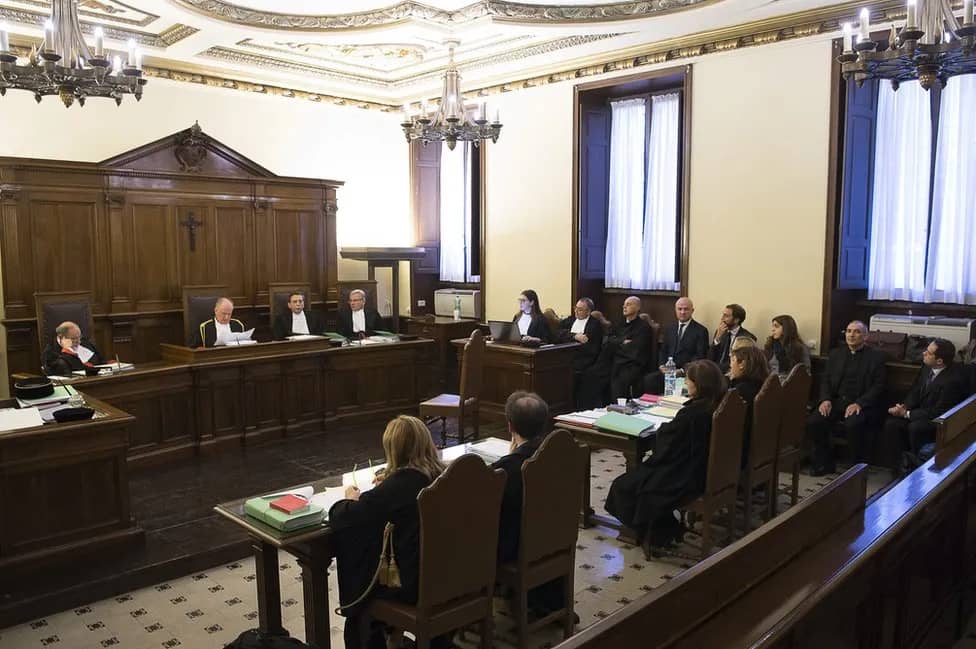ROME—The Vatican’s Secretary of State says dialogue between the Holy See and China is continuing “in a spirit of good will” on both sides, with the Church particularly interested in Catholics being allowed to live their faith while remaining good citizens.
“Catholics in China are fully Chinese and, at the same time, fully Catholic,” said Italian Cardinal Pietro Parolin.
The path of mutual understanding and trust, he added, “takes time, patience and foresight on both sides. We’re trying to find realistic solutions for the good of all.”
In a lengthy interview with Avvenire, the newspaper of the Italian bishop’s conference published on Wednesday, the prelate also denied the existence of two Catholic Churches in the country, one aligned with the government and one with the Vatican.
In the interview, Parolin, who heads the Vatican diplomatic corps, not only outlines the criteria and objectives of the Holy See in its present relations with the People’s Republic of China, but also talks about Islamic fundamentalism, what he describes as the failure of the international community to take ownership for its mistakes in the Middle East, and immigration.
On China, he called for a “new chapter in the history of the Church in China,” saying that for the Vatican, the primary goal in its talks with Beijing is to make the lives of Catholics in the Asian nation simpler, while fostering a reconciliation between the so called official and clandestine communities.
In recent weeks, allegations had surfaced of the Vatican being willing to negotiate with China disregarding the status of local Catholic communities, which Parolin denied.
Observers have long spoken of a rift between Catholics who participate in the “Chinese Catholic Patriotic Association,” the government regulatory body for the Church, and those part of a clandestine Catholic community, which has pledged its faithfulness to Rome.
“The claim that there are two different Churches in China doesn’t correspond to historical reality, or to the life of faith of Chinese Catholics,” Parolin stressed, saying that both communities are eager to “live in full communion with the Successor of Peter.”
“Each of these,” he said, “carries with it the historical baggage of moments of great witness and suffering, which tells us something about the complexity and contradictions that exist within this vast country.”
The Vatican currently has diplomatic relations with 180 of the 193 that are members of the United Nations, with China being the biggest prize among the remaining holdouts. Others include Vietnam, North Korea, Oman, and Saudi Arabia.
Rome has made its eagerness clear. One of the many complications is that the Vatican is the only European country that still has a diplomatic mission in Taiwan. However, a former Vatican Secretary of State once said the Vatican would move to Beijing “overnight” if the green light would come.
On jihadist terrorism and the “piecemeal Third World War” of Francis often speaks, Parolin said that the fact that in numbers there are more Muslim victims of Islamic violence than Christians is proof that the world is not experiencing a religious war.
He did acknowledge, however, that ISIS militants are exploiting Islam to justify their violent activities.
“Their statements on this sense are an attempt to evoke the so called ‘war of religion’. We must not fall in that trap,” he said. “Even many Islamic authorities have condemned terrorism in the name of Islam.”
Parolin also said that interreligious dialogue is a key element in achieving peace, saying that to dismiss it as a “naive idealism” is a sign of “exaggerated pessimism and it is also dangerous.” Overcoming cultural, political, social and religious differences which are centuries old, he said, requires dialogue and patience.
Asked about the military interventions carried out by coalitions or individual countries in the Middle East and Libya, he said that they should always be a last resource, even if they can help bring about peace.
“Intervention by foreign forces often contributes, for all sorts of reasons, to the intensification of conflict and the suffering of civilians,” he said, adding that from the beginning, both in the Middle East and in Libya, the popes and the Vatican have made appeals to end the conflicts.
“Unfortunately, the weakness of the international community in assuming its responsibilities and taking an interest in the suffering of the populations have prolonged the conflicts,” he said.
Regarding the European migrant crisis, where some countries are invoking a need to preserve their Christian identities in order to justify excluding refugees, Parolin said that the “spirit of hospitality” is an essential part of Christian identity and a “concrete application of the works of mercy shown by Jesus in the Gospel.”
However, this doesn’t mean it’s not “legitimate for a country to take legal and juridical measures to protect its cultural identity tied to Christianity.” Yet even then, he added, these measures have to be merciful towards those in need.
Asked about the interest and respect which Pope Francis has earned on the international scene, Parolin began by saying that there’s one factor “often underestimated,” which is the fact that the pontiff is not a political leader nor the head of a multinational company.
“He’s the Successor of Peter, pastor of the Universal Church,” he said.
As such, the Secretary of State said, Francis’ only concern is proclaiming the Gospel, and the pope’s involvement in the dramas experienced by humanity, such as poverty, immigration and climate change is driven by that desire.
















